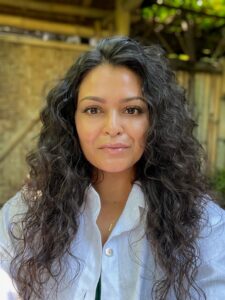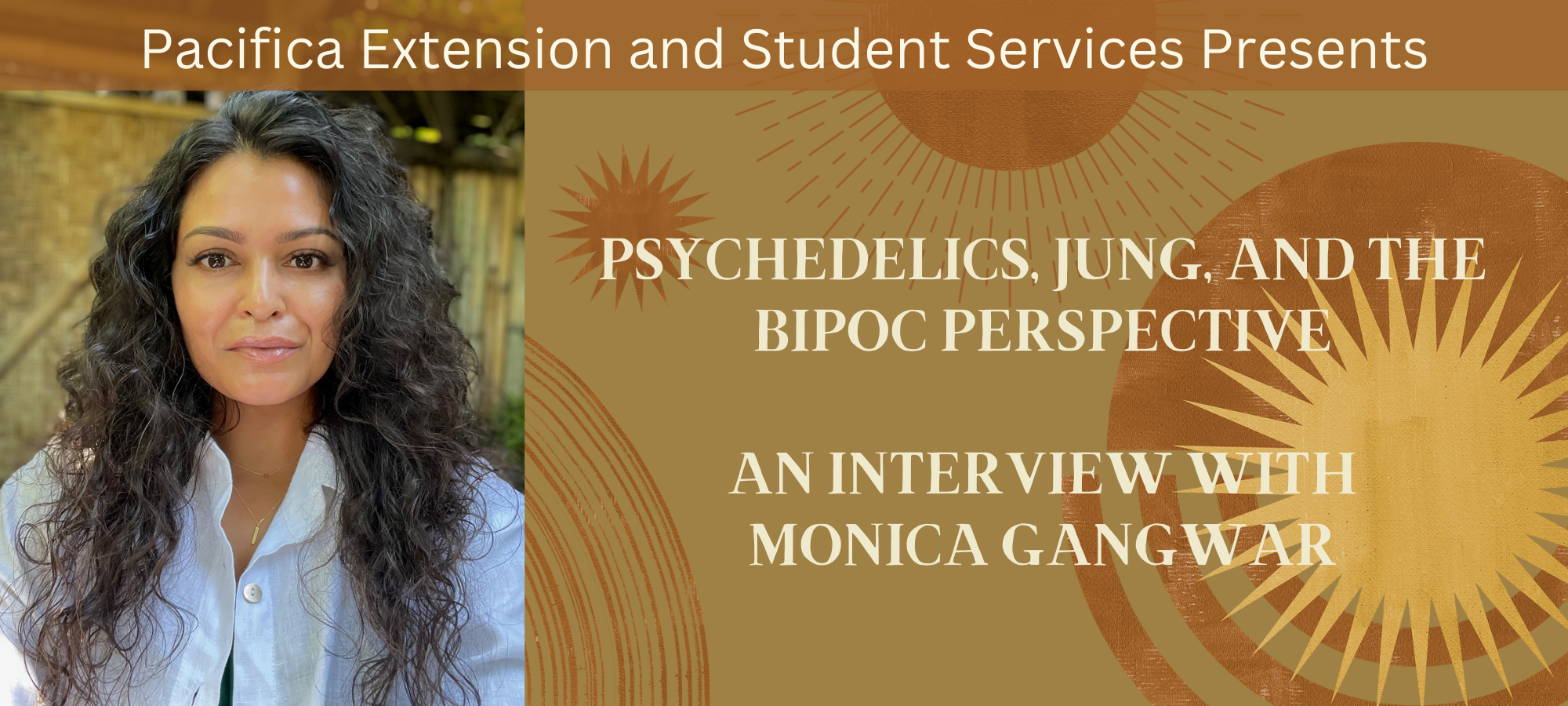Monica Gangwar is a first-year student in the Counseling Psychology Program, who was one of four students who was awarded a scholarship through Pacifica Extension and Student Services to attend Pacifica’s “Individuation and Psychedelics Conversations with Jungian Analysts” conference, which was held Dec 15-17, 2023. I’m delighted to speak with Monica about the conference and also her professional experience prior to coming to Pacifica.
Angela: Thank you for speaking with me. You recently won a full scholarship to our “Individuation and Psychedelics Conversations with Jungian Analysts” conference, so first let me congratulate you on that. What interested you in the conference and what was your general experience of it?
 Monica: I was really interested in depth psychology because it’s helped me in my own journey and I’ve also used plant medicine in a guided, intentional way with people who respect and study the medicine. I’ve done healing, meditative retreats for black and brown people in my community with plant medicine. When I saw depth psychology and psychedelics as the topic, I was very curious about these two worlds meeting. So I was excited to attend. I never imagined I’d be at a school that would put something like this on.
Monica: I was really interested in depth psychology because it’s helped me in my own journey and I’ve also used plant medicine in a guided, intentional way with people who respect and study the medicine. I’ve done healing, meditative retreats for black and brown people in my community with plant medicine. When I saw depth psychology and psychedelics as the topic, I was very curious about these two worlds meeting. So I was excited to attend. I never imagined I’d be at a school that would put something like this on.
Most black, indigenous, and other people of color (BIPOC) are victims of systems of oppression and racism. Not all but most have an understanding of how this harms the psyche because we’ve experienced it. This doesn’t mean we understand how much the unconscious holds due to these experiences. We don’t always get the privilege to tap into our unconscious and see how this oppression and racism impacts us; so I’d like to bring this language and information to BIPOC communities. That played a significant part in me wanting to go to the conference. I don’t see depth psychology spoken of much in my own community and want to change that. I think it is also important to note that plant medicine comes from BIPOC people and is used in a medicinal way and should be respected and understood on a cellular level.
I thought it was a great turnout at the conference, which told me it was something people are interested in. The topics were really interesting because it is such a new topic in this realm and how little so many of us know. What was unique and refreshing about this conference was how the panel asked the audience for their ideas and experiences around using this medicine with their clients. Some important questions and statements were asked, it felt very community centered. One woman’s statement was incredibly significant, she mentioned that maybe plant medicines should not be looked at as the hero’s journey, where you are out in the world but rather you are receiving the medicine and what it has to show you. It was a more feminine approach, which the panel hadn’t considered. Her representation and insight as a woman made me wonder how many women are doing this work with the medicine. Another attendee asked why there weren’t indigenous people at the conference. He felt we were talking about their work, so they should be represented. He got a lot of applause, and it was nice to hear, as I was hoping for more diversity as well.
Angela: Which presentations or discussions stood out for you?
Monica: There were a few. One presentation about how important this work is for women and the indigenous people. And Anna Luisa Teixeira de Menezes presented on “Ayahuasca and the Unus Mundus,” talking about Brazil, psychedelics, and tying it to Jung. Throughout the presentations, we talked about how Jung was against psychedelics. It made me think the opposite way than I anticipated. I came in thinking we should be using psychedelics and depth psychology and how do we unite the modalities? Yet, maybe I should look more into why Jung is against it and what that means. It made me want to go deeper into depth psychology, so I can understand his point of view in order to do justice for my future clients.
Angela: For a time, you ran the Restore Recenter Retreat as a healing space for BIPOC DEI professionals, which provided a safe and supportive environment for individuals to process their experiences and heal. Tell us a little about how the Retreat came about.
Monica: We wanted to work out what we were seeing with BIPOC Diversity, Equity, and Inclusion (DEI) professionals. During Covid, there was a call for these DEI roles, and mostly of them were new. Companies were trying to figure out what DEI is, and people were put in those roles because of their race, gender, and orientation but not because of their knowledge on dismantling systems of oppression within their organization or community. I myself had 10+ years of experience, and in 2022, it was the first time I witnessed significant backlash for these roles created for the purpose of a more diverse, equitable and inclusive work environment. Critical race theory came into prevalence in 2022. In 2023, the supreme court rolled back affirmative action.
Everything was data driven rather than people driven. Everyone wanted to know how we could get more black people or women in these roles, but no one was reckoning with our actual history or how to actually make the work environment safe and inclusive for diverse employees. Most people in leadership roles had no real understanding of systemic oppression. For modern day capitalism to continue to work the way it is, you have to exploit and oppress workers and communities. You have to combat these issues for DEI to actually be successful.
I and others started to see how we were being treated in the work environment. It felt similar to the mother archetype. What we were seeing is a lot of companies are using DEI people as their therapists. Most are not trained for that. When you have role ambiguity, role conflict, tokenism, and being the sole person leading DEI initiatives, asking them to undo hundreds of years of systemic oppression, you quickly come to burnout. I realized with my years of DEI experience nationally and globally, it was time to become a therapist because I saw how much pain people are in when discussing topics like DEI and history but witnessing BIPOC people continue to be pawns in capitalism is unacceptable and will never lead to true liberation and dismantling of these systems of oppression. The demand for therapy has increased and the lack of BIPOC representation in the field is disheartening, therefore I’ve decided to be part of the solution.
Angela: What advice do you give to people currently working in DEI roles to avoid burnout?
Monica: Nature. Spend as much time as you can in nature. If you’re in a predominantly white organization and you’re a person of color, a woman, queer, or trans, it’s important to be within your community when you’re not at work. Find that community that is facing the same obstacles you are, so that you don’t gaslight yourself and you don’t have anyone else gas-lighting your experiences. And when you do win, when you pass a policy or get new resources, celebrate as much as you can. Write your wins down and look at it every day. Because it does matter, no matter how small or how big, they all matter. Also finding someone who understands systemic racism as a therapist is important.
Angela: Thank you so much for speaking with me today and best of luck in your studies at Pacifica.
Pacifica Extension and International Studies has a roster of programs that anyone is eligible to sign up for. Coming up is “Writing Down the Soul: An Archetypal and Mythological Approach to Memoir Writing” March 23, 2024 – December 8th, 2024. Visit here.

Monica Gangwar brings a decade of rich experience in the Diversity, Equity, and Inclusion (DEI) arena, both on a national and international scale. She is also a Returned Peace Corps Volunteer, having served in Nepal from 2017 to 2019, where she dedicated herself to fostering understanding and collaboration across diverse cultures. Presently, Monica is a key member of the team at Colibri Family & Healing Therapy Inc., a BIPOC LGBTQ+ therapy practice located in Long Beach, CA. Her work here continues to reflect her deep commitment to creating inclusive and supportive environments.

Angela Borda is a writer for Pacifica Graduate Institute, as well as the editor of the Santa Barbara Literary Journal. Her work has been published in Food & Home, Peregrine, Hurricanes & Swan Songs, Delirium Corridor, Still Arts Quarterly, Danse Macabre, and is forthcoming in The Tertiary Lodger and Running Wild Anthology of Stories, Vol. 5.


